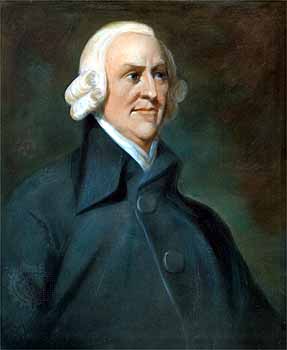
Biography
Adam Smith (1723-1790) was a moral philosopher and economic thinker who is widely considered to be the father of modern economics. Smith’s work is both a cornerstone in the history of modern philosophy and a major source of political and economic reform in the past two centuries.
Smith was born to a widowed mother in the port town of Kirkcaldy on Scotland’s east coast. His father, a lawyer and comptroller, died two months before he was born. After graduating at the age of 14 from one of Scotland’s top secondary schools, Smith entered the University of Glasgow and studied under the influential philosopher Francis Hutcheson. Smith then attained a scholarship to Balliol College, Oxford, where he spent six years studying European literature and where he developed contempt for elite English education and teachers, who, he complained, had “given up altogether even the pretense of teaching.”
Smith began rising to public recognition in 1748, when he started a series of lectures in Edinburgh on rhetoric, belles lettres, and jurisprudence. Around the same time, he met and began a life-long friendship with David Hume, who was also a former student of Hutcheson. At the age of 28, Smith became professor of rhetoric and moral philosophy at the University of Glasgow. His lectures formed the basis of The Theory of Moral Sentiments (1759), which was met with great acclaim in Britain and across the Continent.
In Smith’s day, books and ideas circulated readily, especially between Britain and France. Smith read and reviewed (sometimes on recommendation by Hume) works by d’Alembert, Rousseau, Helvétius, and Voltaire. In 1763, Smith was able to visit France while serving as a traveling tutor to a young English aristocrat. Smith traveled throughout France and Switzerland, meeting d’Alembert, Voltaire, Rousseau, Helvétius, Morellet, Turgot, Quesnay, and Benjamin Franklin. While not uncritical of his new acquaintances, Smith apparently was impressed with Quesnay and other French “physiocrats” who attacked the nobility’s extravagance and the government’s intervention in the economy as harmful to agricultural productivity and national prosperity.
Smith’s travels were helpful in writing The Wealth of Nations, a treatise on the causes of prosperity and the character of commercial life that is regarded as a central foundation for modern economics. He began working on it when he returned to his mother’s Edinburgh home in 1766, and it was published a decade later. The book is a rich analysis of how self-interest guides market processes. It was written not for merchants, but for legislators. Smith sought to contribute to the “the science of a statesman or legislator” by arguing that “universal opulence,” or a broad increase in the standard of living, is best achieved by a market economy.
Smith’s rising public profile secured him a job as Scotland’s commissioner of customs, where he helped the government enforce laws against smuggling. His last decade was consumed by his government position, although he continually revised his Theory of Moral Sentiments and considered philosophical questions.
In 1790, at the age of 67, Smith died a bachelor in Edinburgh, having lived modestly while quietly donating most of his money to charity. On his deathbed, he asked that his unpublished papers be burned, except for those that would become his Essays on Philosophical Subjects, published posthumously in 1795. He never completed a project large work on jurisprudence, which, he believed, would form a whole in his oeuvre along with his books on politics and morality. Smith’s greatest legacy is his moral justification for a free commercial society. He showed that a system of free exchange that puts the individual consumer at its center is far better at increasing broad prosperity than the prevailing mercantilist, protectionist system. His writing had a profound impact on generations of economic theorists, from David Ricardo and Karl Marx in the nineteenth century to John Maynard Keynes and Milton Friedman in the twentieth. His work helped lay down the moral and economic foundations for a great part of the modern world.
For more detailed biographical information, see also:
Jerry Z. Muller, The Mind and the Market, New York: 2007, (chapter on Smith pp. 51-83).